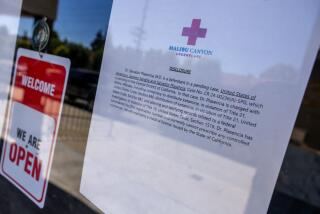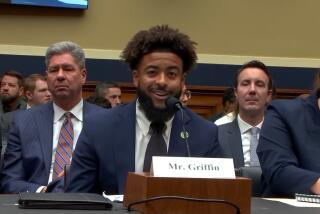HUSKY FOOTBALL: A PATTERN OF VIOLATIONS? : Deposition: Husky Players Sold Prescription Drugs : Medical: Team physician says that medication given to the athletes for injuries or illness was used for profit.
- Share via
University of Washington football players have sold prescription drugs given to them for injuries or illness by members of the university’s medical and training staff, the Huskies’ team physician said in a sworn statement.
The players’ selling of the drugs is an apparent violation of federal law as well as NCAA rules.
Steven T. Bramwell, the Huskies’ team physician since 1976, said in a deposition last year that Washington players--whom he did not identify--sometimes sold pain medication given to them by team doctors or trainers.
Bramwell’s statements were made in a deposition taken for a personal injury suit filed in 1990 against the physician and Washington trainers and coaches by Vince Weathersby, a former Husky running back back from Dorsey High.
A copy of the deposition was obtained by The Times.
In his lawsuit, Weathersby, one of Washington’s leading all-time rushers and receivers, alleged negligence in the treatment of a shoulder separation he suffered during a Sept. 27, 1987, game against Texas A&M.;
The defendants won a summary judgment in King County (Wash.) Superior Court in June.
During the 1991 deposition, Bramwell said Weathersby was given 12 tablets of Tylenol with codeine to ease pain caused by the injury.
The deposition next produced the following exchange between Weathersby’s attorney, Larry J. Landry of Seattle, and Bramwell:
Question: How long does 12 tablets last?
Answer: For these guys?
Q: Yeah.
A: About 24 hours. That’s if they don’t sell it to somebody else.
Q: So that’s done?
A: Has it been done?
Q: Yeah.
A: It has been done.
Q: How did you find out about that?
A: Well, there’s lots of ways of finding out where drugs might go when you ask them and they say they lost it and you find out from another player that--there’s lots of ways.”
Bramwell, a former Washington halfback, said in an interview this month that team trainers and physicians have heard only rumors of such activity.
“I wouldn’t accuse any of the players of doing that other than it’s been rumored to happen with athletes and we know it has happened with private patients,” said Bramwell, a Kirkland, Wash., orthopedic surgeon.
“We certainly try to control the amount going (out), so even if somebody was (selling the drugs), it would be at a very minimal level from us.”
Only licensed physicians and pharmacists are allowed to sell prescription drugs, according to federal law. The street price of one tablet of codeine is $2 to $5.
Although the selling of medication is not addressed specifically by NCAA rules, Steve Mallonee, NCAA director of legislative services, said such activity could be construed as a violation of the NCAA’s “extra benefit” rule.
That rule prohibits coaches, staff members and other representatives of a school’s athletic interests from providing athletes with benefits not available to the student body.
“If (doctors and trainers) look the other way when athletes are able to turn around and make money off something they receive free from the school by virtue of being athletes,” the matter could be a rules violation, Mallonee said.
Even if doctors and trainers are not aware of the players selling the prescription drugs, he said, the activity could be a violation of NCAA amateurism policy, which bars players from using their status as athletes to accept any form of compensation.
“(Athletes selling) uniforms and shoes and all that stuff would be the same thing,” Mallonee said.
The dispensing of medications at Washington became an issue when Weathersby said in an affidavit that he had to drop two courses because he was taking Tylenol-Codeine III. He said the medication caused him to fall asleep in class.
Weathersby, who played from 1985-88, alleged that he needed surgery on the shoulder but was given drugs instead so he could continue playing.
“It was not uncommon for me to doze off during class and team meetings,” he said in the affidavit. “The coaching staff knew this was caused by pain medication, hence they would not reprimand me when I would doze off.”
Weathersby, who lives in Seattle, said he took the medication daily from September of 1987 through January of 1988.
Bramwell said in an interview that Weathersby was administered only 12 tablets over a four-month period.
“If he was (taking the drug regularly), he was getting it from somebody else,” Bramwell said.
Bramwell added that some Washington players might have gone to other physicians for pain medication.
The sedative action of codeine usually wears off after a couple of weeks because the body builds up a tolerance. The kind of long-term use Weathersby described can lead to addiction, they added.
Weathersby had shoulder surgery after his senior season in 1988. He left Washington without a degree in 1989 and was not selected in the NFL draft.
He had a free-agent tryout with the Rams in July of 1989, but did not make the team. In his affidavit, Weathersby said he left camp after 12 days because “I knew I could not hold up physically.”
Weathersby also alleged that he received medication in the training room without prescriptions. “There were numerous occasions when this medication was dispensed to me directly from the trainer with no prescription,” he said.
Bramwell said in his deposition that Washington physicians and trainers followed strict state guidelines when dispensing medication. He denied that trainers gave players prescription drugs without a physician’s consent.
“We don’t know what else we can do,” Bramwell said when interviewed by The Times. “We use very few prescription drugs with the kids. We don’t allow kids to play on Tylenol with codeine. We account for what we give out. What we don’t know is what they do with them. We assume they take them.”
Dispensing of prescription drugs by trainers without the direct supervision and approval of a physician or a pharmacist is illegal, according to a recent NCAA study that evaluated drug distribution at universities.


